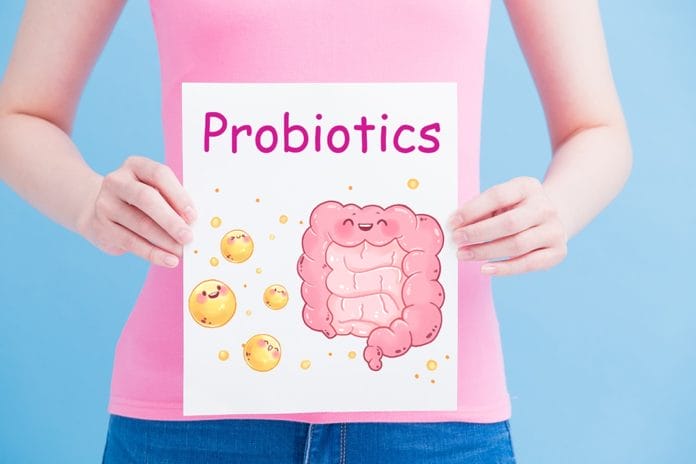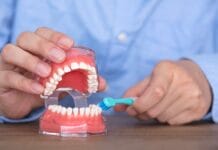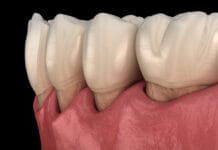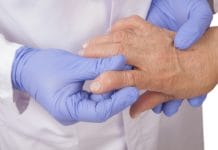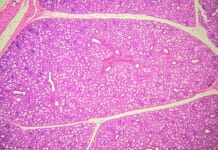The routine of proper oral hygiene is widely understood (while not always practiced) by the majority of society. For most, this practice begins with parents upon the eruption of their child’s first tooth. Those who have visited a dental office for a routine exam and hygiene care will have been given oral hygiene directives. Those instructions will include the staples of maintaining the oral cavity: brush, interdental cleaning, and rinse. While this series of actions is most definitely effective, are we overlooking an important link that can complete and enhance oral hygiene?
Many doctors will recommend probiotics to individuals who suffer digestive difficulties or while taking an antibiotic. Probiotics ensure good bacteria colonization and the elimination of harmful bacteria.
Bacteria: Good vs. Bad
Chances are you have been prescribed an antibiotic for some reason or another in your life. There also exists a viable chance that those infection-combating pharmaceuticals also created uneasiness − or havoc − in the digestive system. While killing the bacteria responsible for creating the infection, unfortunately, these medications eliminate the good bacteria. That’s right; your body’s biome needs certain bacteria that aid in digestion, promote repair of damaged tissue, and prevent harmful bacteria from colonizing and causing disease.1
The human body is compiled of microbes called the human microbiota that is present at birth. These bacteria live throughout the body, including the mouth, which alone houses billions of microorganisms.3 In fact, the human body has more bacteria than human cells.2
This ecosystem contains a slurry of good and bad bacteria necessary for the human body to maintain health. Depending on the species, the harmful bacteria colonizing in the oral cavity is responsible for calculus formation, gingivitis, halitosis, periodontitis, caries, and upper respiratory illness. The good bacteria can help fight off the bad, disrupts biofilm formation, and prevent tooth erosion that leads to caries.
Oral Microbiome
Scientists have discovered that much like a probiotic for the gut, the mouth can also benefit immensely from probiotics targeted specifically for the oral microbiome. Two of the most researched and known bacteria to assist the oral cavity health are S. salivarius A12 and M18. These bacteria help achieve three factors in the mouth.
First, they make a chemical weapon that kills the bacterium Streptococcus mutans responsible for the acidic environment that destroys enamel. That chemical weapon is hydrogen peroxide. Much like we use this on cuts and scrapes, it has a similar effect within the oral cavity.
Secondly, A12 and M18 make it harder for microbes to stick together to form a biofilm, the collection of bacteria, and mucky white plaque that builds upon teeth. Bacteria need to send and receive messages to form this biofilm.4 These probiotics disrupts these messages prohibiting the formation.
Lastly, it reduces the acidic environment by creating ammonia.4 Acid is responsible for destroying enamel and thus leading to demineralization and caries. By reducing the acidic environment, the oral cavity is able to produce a more neutralized pH.
Treating Oral Conditions with Probiotics
S. salivarious K12 and M18 strains act similarly by inhibiting dental caries causing pathogens. However, M18 has a markedly different bacteriocin profile.5 In a controlled study performed in New Zealand, subjects treated with M18 probiotics were 70% more likely not to develop dental cavities after a 90-day treatment, and the amount of plaque and mutans streptococci both decreased by approximately 50% and 75%, respectively.5 Both strains correspondingly reduced bleeding sites, gingival inflammation, and probing depths in test subjects.5
Halitosis, or bad breath, is an undesired oral condition caused by volatile sulfur compounds (VSC). K12 has shown to reduce VSC in 85% of test subjects when given over a period of a week.5,6,8 Probiotics are able to break down these toxic gases and make them gases needed for metabolism.8 Bacteria such as Gram-positive bacterial species are responsible for producing these volatile sulfur compounds. Oral probiotics are able to reduce these forms of bacteria, decreasing malodor.
Because research suggests that 90% of systemic diseases have an oral manifestation, it is important to maintain a healthy oral environment.9 Studies have reported that specific oral bacteria are strongly linked to many systemic diseases such as Alzheimer’s, diabetes, and colon cancer.7 One study concluded that patients exhibit an 80% to 96% reduction in the number of episodes of streptococcal pharyngitis and/or tonsillitis infections during a 90-day treatment regimen of S. salivarius K12.5
Candida albicans is a fungal bacterium present in nearly 75% of oral cavities of humans.6 This is typically a harmless bacterium. However, the event of overgrowth can be harmful to the overall health. C. albicans is the bacteria responsible for oral candidiasis (yeast infection), and because of the increased use of antibiotics, chemotherapy, and immunosuppressants, this condition is on the rise. Lactobacillus strains have shown to inhibit C. albicans biofilm reduction.6
The oral cavity is the gateway to overall health, and it makes perfect sense to ensure the healthy balance of the oral biome. The bacteria that is allowed to grow in the mouth will inevitably enter the bloodstream and be carried throughout the body. Taking the necessary precautions to ensure that the oral cavity remains as healthy as possible will ultimately play a large role in the overall health of the human body.
Administration of Oral Probiotics
Oral probiotics can come in various forms, such as lozenges and chewable tablets that are utilized after performing routine oral care. Lozenges have shown to have an 80% effectiveness of colonization when compared to an ingestible powder form of probiotic.5 It is suggested that these tablets are allowed to slowly dissolve in the mouth in order to gain optimal exposure and promote the colonization of healthy bacteria. The recommended frequency is typically one to two times daily.
Oral Probiotics Conclusion
While brushing and interdental cleaning are integral to oral health, these actions alone cannot always guarantee a stable, healthy oral environment, especially bacteria. Incorporating oral probiotics will marginally assist in creating an ideal healthy oral biome by achieving matters that many cannot accomplish with brushing and interdental cleaning alone.
Before you leave, check out the Today’s RDH self-study CE courses. All courses are peer-reviewed and non-sponsored to focus solely on pure education. Click here now.
Listen to the Today’s RDH Dental Hygiene Podcast Below:
References
- Yttri, J. (28 Mar. 2017). Bacteria: The Good, the Bad, and the Ugly. National Center for Health Research. Retrieved from http://www.center4research.org/bacteria-good-bad-ugly/.
- Da Silva, G.J., Domingues, S. (17 July 2017). We Are Never Alone: Living with the Human Microbiota. Frontiers for Young Minds. Retrieved from www.kids.frontiersin.org/article/10.3389/frym.2017.00035.
- Brown, E. (8 Nov. 2019). By Studying Mouth Bacteria, Scientists Hope to Learn the Secrets of Microbiomes. Smithsonian. Retrieved from www.smithsonianmag.com/science-nature/studying-mouth-bacteria-scientists-hope-learn-secrets-microbiomes-180973509/.
- Hulick, K. (18 Apr. 2016). Newly Discovered Microbe Keeps Teeth Healthy. Science News for Students. Retrieved from www.sciencenewsforstudents.org/article/newly-discovered-microbe-keeps-teeth-healthy.
- Stowik, T.A., Contribution of Probiotics Streptococcus salivarius Strains K12 and M18 to Oral Health in Humans: A Review. (2016). Honors Scholar Theses. 488. Retrieved from https://opencommons.uconn.edu/srhonors_theses/488.
- Chugh, P., et al. A Critical Appraisal of the Effects of Probiotics on Oral Health. Journal of Functional Foods. 2020; 70. Retrieved from https://www.sciencedirect.com/science/article/pii/S1756464620302097.
- Sergent, B. (28 Mar. 2020). Exploration of the Human Mouth: Bacterial Colonies Do Present Dangers. Today’s RDH. Retrieved from www.todaysrdh.com/exploration-of-the-human-mouth-bacterial-colonies-do-present-dangers.
- Nozari, A., et al. The Effect of Iranian Customary Used Probiotic Yogurt on the Children’s Salivary Cariogenic Microflora. Journal of dentistry (Shiraz, Iran). 2015; (16)2: 81-6.
- Agency MABU Marketing Advertising Business Unlimited. Stay Healthy- Healthy Smile, Healthy You: The Importance of Oral Health. Oral Health Program – North Dakota Department of Health. Retrieved from https://oral.health.nd.gov/stay-healthy/.

